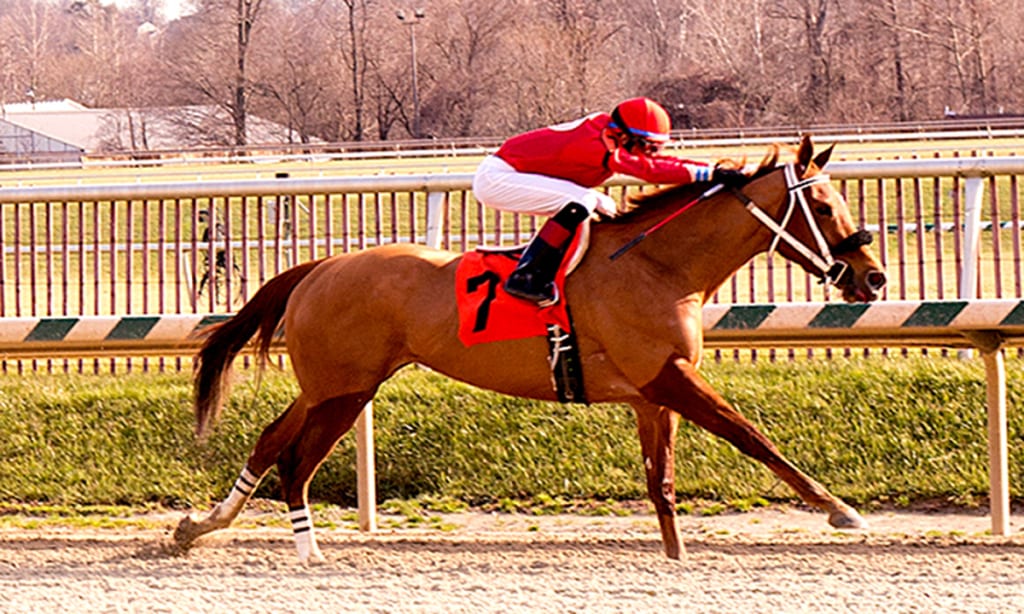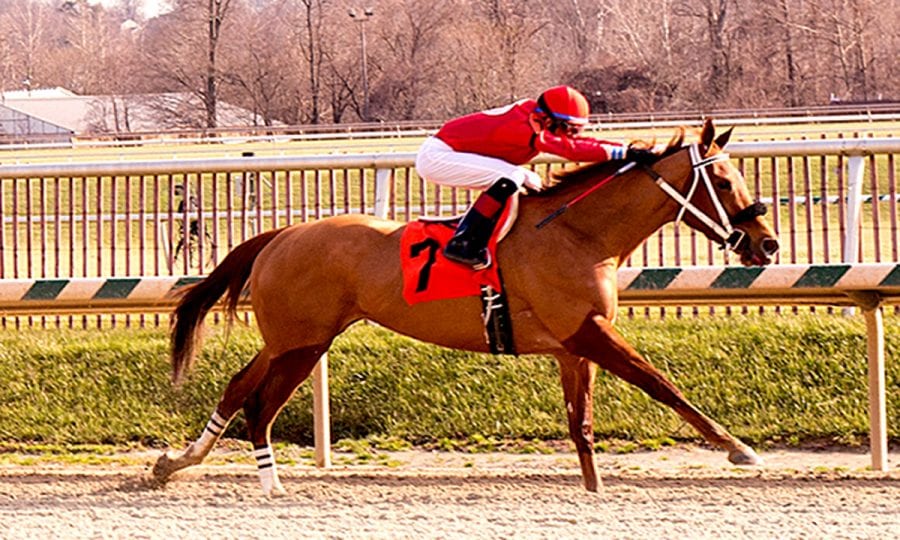
Lady Vivien, here winning on December 27, 2014, was in the middle of a challenging situation. Photo by Jim McCue, Maryland Jockey Club.
by Frank Vespe
Lady Vivien’s about as nondescript as a racehorse can be. She’s a runner more notable for what trainers think she can be — she’s been claimed seven times since May 2014 — than for what she actually is, a horse who’s won five of 32 career starts and earned a bit over $106,000 in her career.
Yet for a couple of weeks in January, the six-year-old Posse mare was the talk of the Laurel Park backside.
The reason for that demonstrates one of the challenges trainers — and racing itself — face in this era of toughened medication regulations.
“An innocent bystander who claims a horse could get ruled off, called a doper,” says trainer Kieron Magee, who happened to be in the middle of the Lady Vivien incident, “and he’s done nothing wrong.”
Call Lady Vivien the poster-horse for the problem of stanozolol. Her single positive test for stanozolol had the potential to implicate three different trainers, two of them entirely blameless.
“I think this is something that should be addressed pretty quickly because it could happen to anyone,” said Kenny Cox, one of the three.
Lady Vivien won for trainer Scott Lake on December 11 in $6,250 claiming company, and Magee claimed her out of that race.
About two weeks later, her post-race test came back with a positive for stanozolol, the anabolic steroid formerly marketed as Winstrol. It had in Maryland been permitted, up to a threshold level, until mid-October. In October, the state changed its rules to remove a threshold level, meaning that the presence of any stanozolol in a horse’s system on raceday will now trigger a positive. Some veterinarians continue to prescribe it, however, for therapeutic purposes. It also, of course, has performance-enhancing benefits.
Lady Vivien was one of a half-dozen horses, two in Lake’s care, who recently tested positive for stanozolol in Maryland. It is unknown what caused the sudden spike in positives, though the rules change, sources have said, played a role in at least one of them.
At first, when Lady Vivien’s test came back, it was a garden-variety story of a horse with a positive test.
Two problems arose, however. First, stanozolol is slow to leave the body; some horses have been known to show traces of it up to 45 days after being treated, studies indicate.
Second, no one bothered to tell Magee, who then ran Lady Vivien on December 27 — a few days after the positive, about which he had not been informed. She won again — and was claimed again, this time by Cox.
That put Magee in a dicey position, “sweating out a test,” as Cox put it. If it came back positive — a distinct possibility, given that it had been just 16 days since she’d registered a positive — the horse would have had to be disqualified, costing Magee and owner Robert R. Beck the winner’s share of the purse. Moreover, Magee would have been at risk of a fine, suspension, and points on his record.
He was not happy.
He says that he told a steward with whom he spoke, “Whatever you all decide, I will sue you guys if you try to disqualify me and take the money away.” He says that the steward described the stewards as being in “territory that we don’t know what to do.”
The top two finishers in a race in Maryland typically are tested after the race. Thus, Magee would have to wait — a week to 10 days, normally — before knowing whether Lady Vivien’s win would stand.
That also put Cox, who had claimed the mare, in a difficult spot. He could not run his new charge until the second test came back clean. If it did not come back clean, he would have to sit on the sidelines and wait until the stanozolol cleared her system. That would cost time and money with a horse in good form.
Cox says that Maryland Racing Commission officials told him, “You can run the horse if you want to.” But they also told him that a positive test would result in a disqualification and probably other penalties.
Fortunately for both Magee and Cox, the second test came back negative. Magee and his owner were able to keep the purse money Lady Vivien had earned. Cox had a horse he could race.
Still, both trainers believe that the rules must change, for the well-being of both trainers and horses.
“My biggest problem is how my particular case was handled, and nobody gives a damn,” said Cox. ” Any horse that comes back with a positive, you should have the option to return it.”
Magee said he agrees.
“It should not have happened this way,” he added. “I just think from now on, every horse that’s claimed should be tested for steroids.”
The void-claim solution, however, is not in the immediate offing, said Maryland Racing Commission Executive Director Mike Hopkins. He said that, depending on the drug — stanozolol is one of only a few medications used on horses with such lengthy withdrawal times — a horse with a positive test would be placed on the stewards’ list and become ineligible to start until showing a clean test. The claimant would be informed but unable to take any action, other than waiting.
Hopkins said that allowing the claim to be voided would require regulatory action, which would take months. It also raises questions: who pays which bills and for how long, among them, and what happens if a horse injures itself during the interim period. He couldn’t say whether the Commission would want to go down that road, particularly given the rarity of such occurrences.
“I’ve been here 30 years,” he said, “and I don’t remember a claimed horse coming back positive before this one.”
That’s cold comfort to Cox, who suggests that a void-claim rule would benefit not just trainers and owners but also horses, since it would serve as a stronger disincentive to using the now-prohibited steroids.
“If we’re about protecting the horses, this isn’t doing it,” he said.
As for Lady Vivien, Cox ran her on January 31. She finished third, as the favorite, and was claimed by Keisy Cartagena. That marked the fourth consecutive race in which she was claimed.










The option to return a claimed horse following a positive test is standard policy in NY, PA and Ky. This rule is a no-brainer. This rule is also in the conditions of sale for Fasig Tipton, Keeneland Sales and Ocala Breeders Sales Company. The seller pays the expenses (board, training, shipping,and vet).
Five of the six horses testing positive were running for a tag. Lady Vivien was the only one to be claimed. None of the other horses have run back since their positive tests. Since Maryland does not test all the claimed horses the MRC has no way of knowing how many times this situation may have occurred. Easy solution to protect the new owners is to allow the option to return.
Ok first of all, ALL trainers know which trainers use steroids(Lake being a major one) and trainers you simply don’t claim from because of the things they put in their horses, so they shouldn’t act so shocked… Second of all, K. Magee is not one to throw stones, only when he became best friends with the infamous Juan Vasquez did his horses start to win, he’s just lucked out that they weren’t ACTUALLY testing in MD previously. Thirdly, they would be able to tell if the horses levels had gone down from the original positive that obviously the new trainers were not at fault. You DO have the option of voiding the claim if a positive comes up, and even if the horse doesn’t win, the claiming trainer can order(at their expense) a drug test to ensure the horse is clean. They just don’t like this no-tolerance policy because their numbers will go down, so by playing the dumb nieve side of the argument, the make it seem like the zero-tolerance is no good because Mr. Magee will no longer be able to give steroids to his horses just enough to stay in the threshold. Common sense drowns all their concerns, these trainers that voice out about the zero-tolerance policy are the ones that are concerned about being caught! (BTW they must have run her back quite quickly to not know about the positive)
Thanks for checking in, SR. Couple factual points: 1) In Maryland, you do NOT have the option of voiding a claim for a positive; in some other states, yes, but not in Maryland. As the article makes clear, having a void-claim rule for a positive would require a regulatory change, which would take time. 2) In terms of knowing whether the levels have gone down and whom to blame if so, that’s something that arguably the stewards would take into account in the penalty phase – or maybe not. It was made clear to Cox in this instance that if he ran, it was at his own risk. 3) As the article states, Magee ran the horse back in 16 days, which would have worked — but no one had told him about the positive. Whether Magee is a good guy or a bad guy is immaterial; in this case, he was placed at risk in a situation in which he was blameless, and that could happen to anyone.